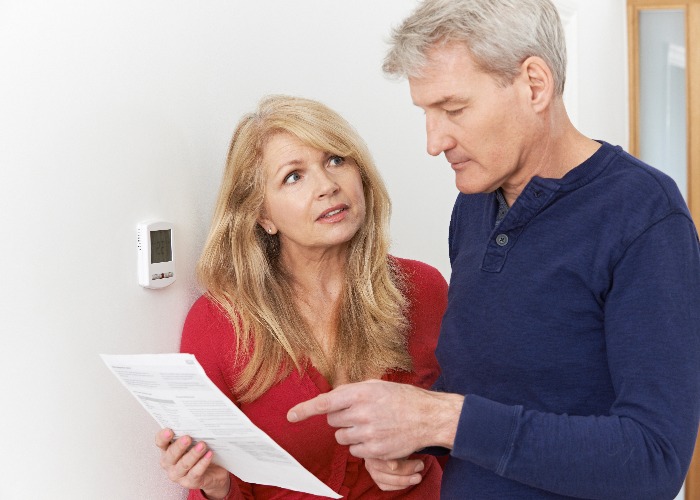Don’t make the energy crisis worse: what to do before going into debt to pay your energy bill

Your energy bill is a priority bill, so you have to focus on paying it, but there are other options beyond dropping into debt.
Energy bills are a huge concern for many of us at the moment. In fact, a recent study from Opinium revealed that a whopping nine in every 10 people are worried about energy bill costs.
Frankly, I think the other one in 10 are being a little dishonest about their feelings towards energy bills.
Struggling to pay the bills
Energy bills are already incredibly high by usual standards, so it’s not hugely surprising that plenty of people are struggling to meet their bills.
And, of course, things will only get worse from next month.
While the Government's energy price freeze is hugely welcome, it still means the average annual bill is going to hit £2,500 from October.
That's an increase of over £500 compared to current rates, which are already pushing many households to the limit: a new study from Equifax suggests that one in 10 households are currently in arrears on utility bills.
Of course, that includes all sorts of monthly bills, beyond just the energy bills, but it’s a pretty clear demonstration of just how stretched household finances already are.
Given these difficulties, it may be tempting for some to turn towards debt in order to meet those energy bills.
However, that may not be a great idea ‒ there are other options open to you first which are worth considering, before borrowing to meet your bills.
Speak to your supplier
The first thing to do if you’re worried about paying your bills is to speak to your supplier.
Right now, they are getting plenty of experience with helping people who are having payment difficulties, and so are well placed to put together a payment plan that works for you.
You can ask for help in a variety of ways, including payment breaks or reductions, more time to pay, or access to the ‘hardship funds’ that suppliers offer.
These are grants that are open to customers in difficulty, and which can be used to clear energy bill debts.
Get what you’re entitled to
Many of us don’t actually receive the benefits and grants to which we are entitled.
There can be all sorts of reasons for this, from fears over a complicated application process to simple pride. However, given the way bills are rising it makes sense to get every penny you can at the moment.
A great place to start is the Turn2us website, which can help you quickly ascertain what you might qualify for.
Get help with your debts
Another option is to speak to a specialist debt charity, like StepChange, the National Debtline or even Citizens Advice.
These organisations can go through your finances with you and help you manage your money more productively so that you are better placed to meet those rising energy bills.
If there are other debts in place, then a quality debt charity can assist you in putting together a plan to clear them, as well as outlining your various options.
Make energy changes
Ultimately one of the biggest things that we can all do about our energy bills, not just in the months ahead but in the years to come too, will be adapting our own energy use.
As a result, making changes as soon as possible is a good idea.
For example, ensuring that your home is as insulated as possible is a smart move ‒ this means that the property will retain the heat generated, meaning it takes less energy in order to keep it warm.
Having energy-efficient appliances will also help here.
If you have an older boiler, then it takes more energy in order to heat your property compared with a newer, more efficient model, for example, while installing energy-efficient lightbulbs now ‒ before you need to have the lights on more frequently ‒ is worthwhile.
The bills that need to take the priority
Not all bills are made equal ‒ some come with far bigger repercussions if you are unable to pay what you owe than others.
As a result, there are effectively ‘priority bills’ that you need to focus on first.
There’s an excellent run-through of these priority bills on the StepChange Debt Charity website for each region of the UK that’s well worth checking.
For example, in England and Wales, these are the priority bills and the worst-case scenario you could face if you fail to pay them:
- Child maintenance ‒ imprisonment;
- Council Tax ‒ imprisonment (in England, but not Wales);
- County Court Judgment (CCJ) ‒ money taken directly from your salary/bank account;
- Energy bills ‒ supply can be disconnected;
- Hire purchase/logbook loan ‒ the creditor can apply for a CCJ;
- Magistrates fines ‒ imprisonment;
- Mortgage ‒ repossession;
- Phone bill ‒ the supplier can apply for a CCJ;
- Rent ‒ eviction;
- Secured loan ‒ repossession;
- Tax ‒ HMRC can apply for a CCJ, apply for your bankruptcy;
- TV licence ‒ fine.
*This article contains affiliate links, which means we may receive a commission on any sales of products or services we write about. This article was written completely independently.
Comments
Be the first to comment
Do you want to comment on this article? You need to be signed in for this feature